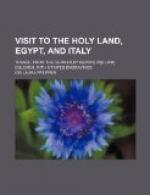On my return I met the funeral of a poor Turk. If my attention had not been attracted to the circumstance, I should have passed by without heeding it. The corpse was rolled in a cloth, fastened at the head and at the feet, and laid on a board which a man carried on his shoulder. At the grave the dead man is once more washed, wrapped in clean linen cloths, and thus lowered into the earth. And this is as it should be. Why should the pomp and extravagance of man accompany him to his last resting-place? Were it not well if in this matter we abated something of our conventionality and ostentation? I do not mean to say that interments need be stripped of every thing like ornament; in all things the middle way is the safest. A simple funeral has surely in it more that awakes true religious feeling than the pomp and splendour which are too frequently made the order of the day in these proceedings. In this case are not men sometimes led away to canvass and to criticise the splendour of the show, while they should be deducing a wholesome moral lesson for themselves, or offering up a fervent prayer to the Almighty for the peace of the departed spirit?
Houses—theatres—ca
rriages.
The houses in the whole of Constantinople, in which we may include Pera, Topana, etc., are very slightly and carelessly put together. No door, no window, closes and fits well; the floorings frequently exhibit gaps an inch in breadth; and yet rents are very high. The reason of this is to be found in the continual danger of fire to which all towns built of wood are exposed. Every proprietor of a house calculates that he may be burnt out in the course of five or six years, and therefore endeavours to gain back his capital with interest within this period. Thus we do not find the houses so well built or so comfortably furnished as in the generality of European towns.




